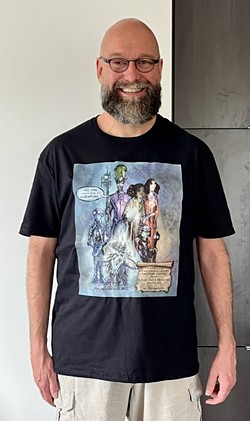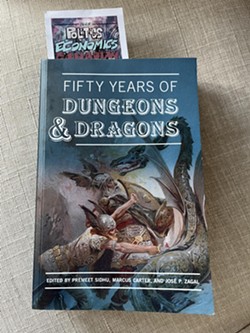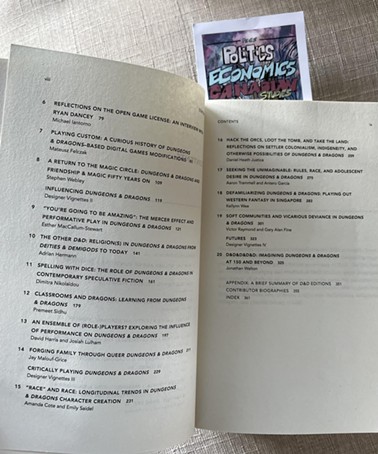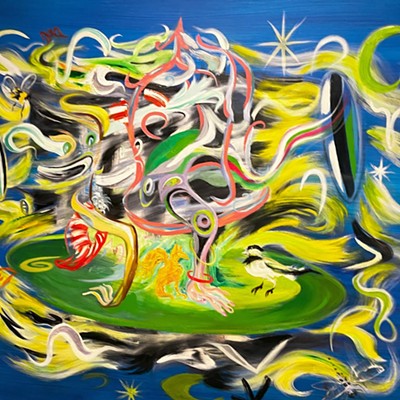First things first: you don’t have to know how to play Dungeons & Dragons (D&D) to take a new course developed by Jeff MacLeod for January 2025, called Wizards, Rogues and Elves: Exploring Politics Through Dungeons & Dragons.
It’s a 3000-level (or upper year) special topics course, cross-listed within the departments of political studies and cultural studies at Mount Saint Vincent University (MSVU).
No experience is necessary, but a social studies credit is required as a prerequisite. However, if you did want to try your hand at the game before the course begins, MacLeod will help you figure out how to get started. “Just email me,” he says.

So, what is D&D? In short, it’s an imaginative role-playing game developed in the ’70s in the United States, says MacLeod, which did have war-gaming roots, “where people that were interested in Napoleonic war-gaming developed it as a fantasy war game.
“But it’s really transcended that and become something else over the past 50 years,” to become a collaborative role-playing game where you assume a character or develop a character using the D&D game system. For example, you can be an elf, wizard or a rogue and use that character to enter adventures.
Within these adventures, you take on the role and abilities of your character and work with other players’ characters around the table. When it comes down to resolving an action within the game, this usually involves rolling dice, called a dragon dice, which is a polyhedral dice—and then comparing the dice roll to a score your character has.
“But that’s not the really juicy part,” says MacLeod. “The juicy part is the roleplay encountered and how players engage with it.” Do you talk to the dragon, or do you fight the dragon?
Do you try to negotiate with the enemy you may encounter or try to find another way to resolve conflicts?
Each adventure is led by a game master or dungeon master (DM). For MacLeod’s new course, he wants students to take on this role, and says those who do will receive extra credit. “I'll demonstrate [playing DM] and I might have guest speakers come in and demonstrate how to play DM but for the most part, I want our play sessions to be student-driven, student-curated.”
The role of DM is “a bit of an art form,” says MacLeod, and a good one is a sought after person because it’s an interesting skill to be able to manage the game world.”
The DM curates and presents the adventure for the characters to enter the world and try to resolve a problem within. They also play the role of non-player characters, or NPCs, which means they have to think about how creatures, or monsters, within these invented worlds will react to what the players do. “So, there’s a referee of the experience,” says MacLeod.” And there’s a D&D rule-system to determine the basics of adventures and gameplay, meaning you don’t go in blind, he says. “But it’s not like other games in that it’s not really about winning—it’s more about the experience of a slice of imagined life.
“It’s as close as you can get to going into [Tolkien’s] Middle Earth and actually imagining it,” says MacLeod. “It’s hard to describe but when you see it, it gets a little clearer.”
He plans on running at least three play experiences within the course, with each game taking roughly three to four hours.
Out of the 30-student cap that MacLeod has set for the third-year course, 27 students from different faculties across MSVU have joined.
“For a special topics course that’s not required for a degree to have this many people in it already–that’s pretty unusual in my experience,” says MacLeod, who has been teaching at MSVU for 20 years. He conceived of the course last year as a new way to teach politics and culture rather than through the work of J.R.R. Tolkien’s Lord of The Rings universe, which he had done in the past.
He had written and published an essay “Tolkien and Dungeons & Dragons” in 2019 comparing the two topics, “because Tolkien was very influential in creating that tabletop role-playing game—and I thought, ‘why don’t I just go and make a course on the value of role-playing games, specifically [D&D], in thinking about how power and group politics work’—and it just snowballed from there.”
MacLeod is an arts-based researcher whose own work involves developing a graphic novel. He’s also a regular Hal-Con attendee. When it came to developing this new course, MacLeod says “I just see the value in having a creative, imaginative way of thinking about power and group politics and developing empathy, because what an interesting way to develop empathy if you take on the role of the other within a character you’re playing.
Taking this thought-experiment through an artistic and creative lens, means students will think about what the character is like, what their motivation is, who they really are, “and it gets you out of your own head,” says MacLeod.
“A real part of political studies education is developing empathy and developing an appreciation for what others feel and what they think, and how they do things.” MacLeod says that if that happened more often, there would be potentially less conflict in politics and less misunderstanding. “Tabletop role-playing games like [D&D] have a potential for developing empathy because, in order to have a rich playing experience, it has to be a collaborative group, problem-solving experience—plus, you’re learning how to do that in an interesting way.”
The half-unit course will run from January to May in 2025 and will see students exploring literature around D&D, as well as playing the game, for two-and-a-half hours every Friday morning throughout the term.
MacLeod says that right now is considered “the golden age of D&D scholarship” because of how many professors and faculty and grad students are taking an interest in it. This means that MacLeod will be using an MIT Press publication from 2024 as his course text, called Fifty Years of Dungeons & Dragons.
The book is a collection of essays from scholars examining D&D from many lenses, including Indigenous, queer and two feminist writers who, for example, “look at the visual art in D&D rulebooks and talk about what they contribute to a narrative around gender and role-playing games—so there’s lots of interesting, critical literature.”
Along with this book, MacLeod will introduce students to his own work and teach them how to develop D&D characters to play the game. “They will enter scenarios and work together to deal with issues within a game environment, so part of exploring D&D will be playing the game.”
MacLeod has been playing D&D since 1981, he says, when he was in elementary school. “I’m very thankful to [D&D],” says MacLeod. “I was a nerdy kid with coke bottle glasses and socially awkward, but the game helped a lot because I was an artsy kid who could draw and had imagination.” The group of kids he played with early on immediately gave him the role of DM which he says allowed him to develop friends “that probably wouldn't have given me the time of day otherwise,” who became a part of his D&D group. “One of my most cherished memories from life as a kid is playing [D&D], so I have a great affection for it.”
He remembers the first D&D adventure he played like it was yesterday, which was from a basic red-box set you could buy and was called “Keep on the Borderlands.” It was an adventure that starts with going to a castle and the characters playing being asked to go into “the Caves of Chaos, because there was a band of orcs that were terrorizing the countryside and your job is to go and address that.” Young MacLeod was playing an Elvish wizard, along with a friend who was a fighter and a friend who was a dwarf. They all got together to address the terrorizing orcs. “It was fantastic,” recalls MacLeod. “I just thought it was unlike anything else I played and it wasn't like anything else I'd experienced as a kid, in an imaginative sense, where you’re participating in creating the story.”
He says that D&D was a precursor to video games, “but I don’t think it can quite be replicated.”
“The experience of a group of people sitting around the table imagining and storytelling together, it's a little like improv theatre with dice and rules—and in that sense, it's quite surprising and interesting that so many people have embraced it.”
But having it as part of the education system is long overdue, he says, although it’s being done by some in school systems outside of Canada and within the United States. “I think there’s a real value in it, so I’m testing it now to see how it works—it’s an investigation as to how engaging and effective this kind of education tool can be.”
Using creative and imaginative approaches to course design and development is not a new thing for MacLeod. “I’ve been doing it most of my career,” he says, “and there have been other faculty at The Mount that use ‘arts-based’ methods all the time.”
MacLeod is part of a faculty group called CARIT, which stands for Community for Arts-Informed Research and Teaching. “This is a group of scholars that use what we call arts-based methods for thinking about academic issues,” says MacLeod, “which can be cast as alternative ways of conceiving of issues.” CARIT has involved students and faculty from Dalhousie University in the past, but it’s mostly MSVU faculty, he says. Part of the work this group has done is to “make the academy very receptive to using arts and math in the arts and social sciences and to create and share meaning,” says MacLeod. That, along with the success MacLeod has had in his own research made the department and the university very receptive to his newly designed course for the winter 2025 term.
Using D&D is just another variant on an arts-based method. “It’s an idea that may seem unusual, but it really isn’t,” says MacLeod. “It’s the future of how we’re going to do university education in many ways–not replace it, but complement it.”
For those eager to learn as first-timers, MacLeod says you can learn how to play the game in five minutes. He says the best way to learn is to play. “It can look intimidating, because you have the core rule books that can be hundreds of pages, but you don't need all that,” says MacLeod. You just need a couple of simple concepts and rules that are integral to making up a character, but you can go on a website like D&DBeyond and make up a character for free in a few minutes, he says.
Finally, MacLeod says there are communities already out there that are easy to find online that meet up in and around Halifax regularly. If you get stuck, remember: just email him.














